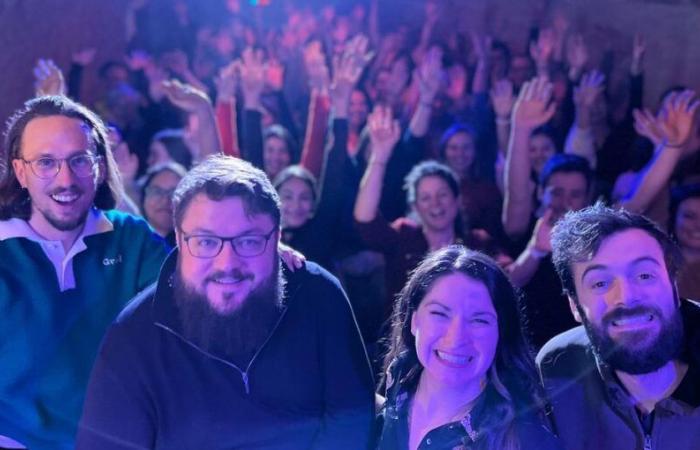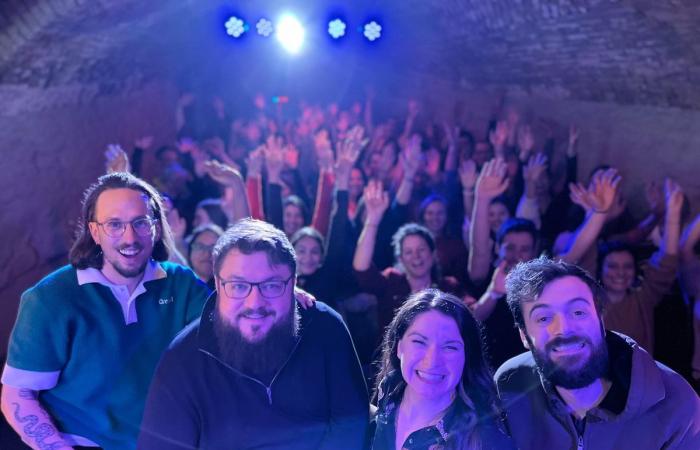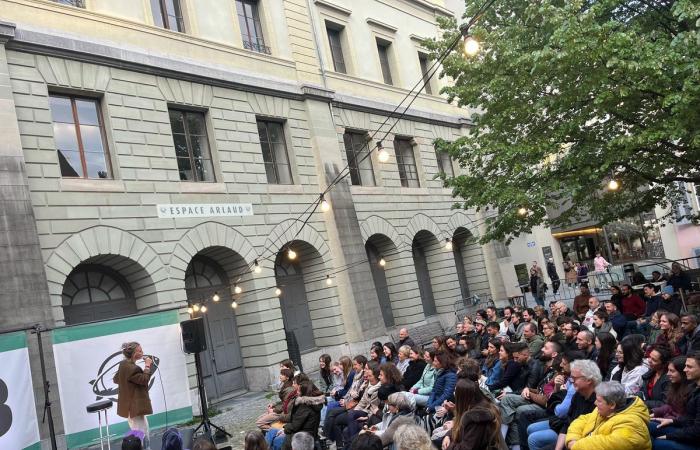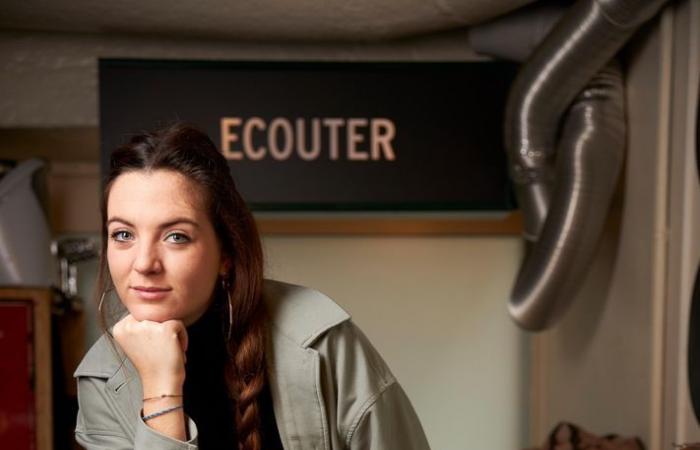Investigation of a phenomenon –
Comedy clubs, a new school of laughter that pays big?
Humor and little money. Stand-up sets are spreading across French-speaking Switzerland. But apart from a few stars, not all comedians make a living from their art.
Published today at 6:37 a.m.
In Carouge, the Caustic Comedy Club is the only theater in French-speaking Switzerland dedicated entirely to stand-up.
Caustic Club
Subscribe now and enjoy the audio playback feature.
BotTalk
- Stand-up in French-speaking Switzerland is experiencing growing success in comedy clubs.
- Comedians often struggle financially despite increasing popularity, with some having to seek private financial support.
- Radio columns offer a new opportunity for visibility.
A curtain, a microphone, and a flood of jokes in front of a hilarious audience. Throughout French-speaking Switzerland, stand-up is all the rage in comedy clubs. Comedian sets swarm into bars, restaurants and nightclubs – more rarely in performance halls. The public is there. Enough to give everyone a thumbs up? Not quite…
If “laughing is good for your health”, stand-up artists sometimes laugh jolts when calculating their income at the end of the month. Because the economic model remains precarious for comedians. “There’s this feeling that stand-up is entirely improvised. This natural, live aspect is part of the magic of stand-up, observes Emilie Chapelle, co-founder of Caustic Comedy Club in Carouge. But, in reality, artists do an impressive amount of work upstream, as authors.” However, a large number of them struggle to make ends meet. “Nearly half of our members, or more, have another paid occupation alongside their practice,” specifies Julien Amey, general secretary of theFrench-speaking Union of Humor (URH).
Hats off, the artist!
Often, stand-up artists are paid a salary. “When Thomas Wiesel started, it wasn’t even about the hat, it was about the sandwich!” entrust Sébastien Corthésycomedian, producer and director of Jokers Comedy. Behind the anecdote, the situation is complex. “We are against hat-based remuneration which devalues the work of artists,” reacts Frédéric Recrosio, comedian at the head of the Bulimia Theater. To play more often and “test” their material, some accept it, but then create a precedent harmful to the profession, because little by little these logics take over.”
The Lausanne theater, which he co-directs with Marion Houriet, has set up sets of paid comedians: the Couleur 3 Comedy Club (in partnership with Couleur 3), the Open Air (with the complicity of the Caustic Comedy Club) and the Boulimy Comedy Thursday. “We always play to sold-out crowds,” he notes. For an evening with two performances, we pay the artist 500 francs, adds Marion Houriet. Playing twice and sold out is our constraint to be able to approach the fee of 300 francs per visit, which is the rate recommended by the URH. We also pay the rental of the place, the royalties (which go to the comedian) and the entertainment tax. The artist who takes charge of the animation receives a fee of 750 francs.
In Carouge, the Caustic Comedy Club is the only theater in French-speaking Switzerland dedicated entirely to stand-up. Emilie Chapelle and Olivia Gardet offer several options in this place that they founded in 2017. Le Caustic operates with co-production contracts, i.e. a 50-50 sharing of ticket revenue. For the public, the price is on average 27 francs.
The theater organizes comedy shows on site and off-site. In this model, a minimum amount is guaranteed for artists. At the same time, their company Caustic Sàrl produces three artists: Cinzia Cattaneo, Thibaud Agoston and Felix Ringaby. “We help them develop their careers and organize their tours,” explains Emilie Chapelle. The bulk of turnover comes from private mandates with companies or institutions and productions of shows in large venues via transfer contracts.
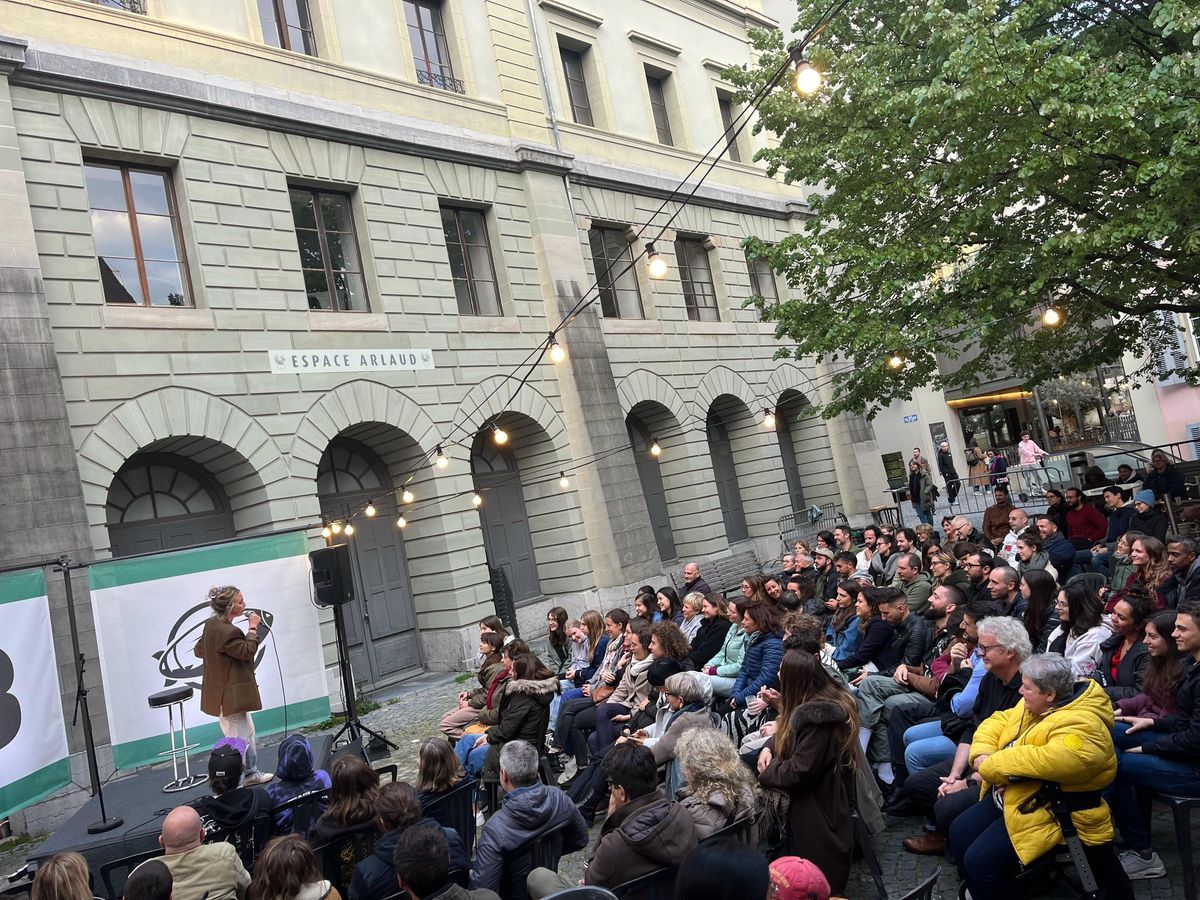
In the spring, the Théâtre Boulimie sets up its open air in front of the doors of its hall, at Place Arlaud in Lausanne.
DR
“If we don’t make enough revenue to pay artists properly, we have to change the gauge, increase the price of tickets, or even look for money elsewhere,” explains Frédéric Recrosio. I find the model of Kremlin Comedy Club in Monthey, created by Philippe Battaglia. He went for private money. Brands sponsor its events and bring their customers.”
The road to support and subsidies
Because, with rare exceptions, subsidies are rare in the world of stand-up. The Caustic Comedy Club receives no public support. “We face the problem that this discipline is not recognized in the cultural ecosystem. Programmers are more cautious about stand-up proposals, and often ask if there are personalities in the show. The path is being made, we feel that curiosity is developing little by little,” notes Emilie Chapelle.
“We are facing a long-standing prejudice: humor works well, so there is no need for money,” observes Julien Amey, secretary general of the URH, born in 2020 with the aim of structure this branch of the performing arts. And the road is still long. “We have in mind Yann Lambiel or Thomas Wiesel who are a hit. But there is a whole emerging wave that needs financial support for writing work, rehearsals and places that allow sketches to be tested,” insists Julien Amey. Sébastien Corthésy states for his part: “We assume that a stand-up show costs almost nothing and that the writing costs will be covered by the copyright. But that doesn’t correspond to reality.”
At this point you will find additional external content. If you accept that cookies are placed by external providers and that personal data is thus transmitted to them, you must allow all cookies and display external content directly.
Allow cookiesMore info
Aude Bourrier devotes herself with passion to her career in humor. Coming from the world of subsidized theater, where she benefited from intermittent work, she first combined theater and stand-up. She is now close to devoting herself fully to comedy, although achieving financial stability is a challenge. Because writing and rehearsal periods are not paid in comedy. The artist underlines the importance of increased support for stand-up, without which professionalization of the profession is impossible. “The SSA scholarships to support the writing of comedy shows are a good start, but we are still seriously lacking in long-term resources.”
Radio chronicles
Are radio columns a new El Dorado for comedians? “Economically speaking, it can make ends meet if there is real regularity, but above all we have observed a new path for stand-up since the arrival of the Couleur 3 Comedy Club supported by the RTS and the Théâtre Boulimie. Columnists very quickly have access to paid sets and residencies without going through the “traditional” stages of stand-up in climbing the ladder, with at the start working in the hat in bars, observes Olivia Gardet. There is therefore this new springboard specific to French-speaking Switzerland which exists in parallel with the very precarious economic model of stand-up.”
Member of the RTN pool of comedians and sometimes columnist on One FM, Aude Bourrier appreciates these enriching opportunities, which offer her more visibility. Indeed, a large part of the work of a comedian consists of broadening his fanbase to then be able to fill the rooms. “This is important because comedians are often paid 50% of box office revenue,” she recalls. However, she deplores the fact that “certain radio stations still ask for volunteer columns, which must change to better support comedians”.
At this point you will find additional external content. If you accept that cookies are placed by external providers and that personal data is thus transmitted to them, you must allow all cookies and display external content directly.
Allow cookiesMore info
Radio columns enjoy an immense advantage: they are relayed on social networks. A major springboard, notes Frédéric Recrosio: “The takeoff is the networks. Yann Marguet and Thomas Wiesel have acquired a huge audience by being broadcast on platforms. But, for the moment, there are few people who present themselves exclusively online, notes Julien Amey: “In French-speaking Switzerland, I have not yet spotted talents who are content with videos on the networks. The stage, radio or TV remain obligatory passages.
Everyone agrees that humor needs to be structured and find funding to support writing. The creation of the UHR is a first step. To convey a message: as exhilarating as it may be, this discipline is certainly a passion, but also a profession.
Cinzia Cattaneo testifies: “The comedy club helps to strengthen writing”
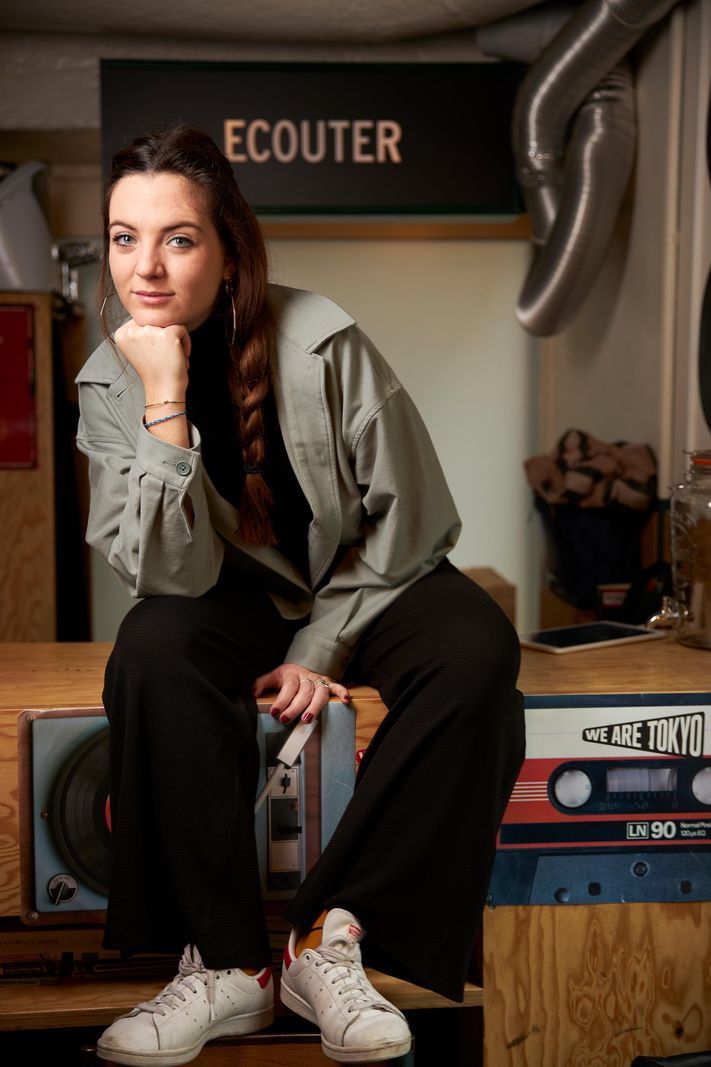
The Genevan Cinzia Cattaneo has been roaming the French-speaking scenes for several years. In 2024, she received the Humor Prize from the Swiss Society of Authors, in the emerging category.
Yvain Genevay
Rising star of French-speaking stand-up, Cinzia Cattaneo had her very first comedy club in Paris, at the Fridge. Far from being cold in the eyes, the Genevan went for it with nerve. She says: “I went there as a tourist, I was introduced to the programmer, who asked me to come back the next evening, for a three-minute set.” The next day, an artist is missing. “In euphoria, I opened the evening. It went really well, so I got my ticket to this stage.”
The 28-year-old stand-up artist, awarded this year with the SSA New Talent in Humor Prize, scours comedy clubs – particularly the Caustic in Carouge, and in Paris – to gauge public reactions. Because the exercise of the humor stage nourishes the writing of a show. “Stand-up is so dependent on laughter that the comedy club is a tool that allows you to feel whether you are on the right road or not.” The comedian, currently on tour with his solo “With people”, works his shows in ten-minute increments. “The comedy club helps to strengthen writing,” she emphasizes. On the other hand, we cannot test everything on set. A slightly more touching passage, for example, wouldn’t work.”
If the comedy club allows you to test jokes, it also plays the role of a business card to catch the eye of programmers. Depending on the option, the passage will be approached differently: “If we want to sell, we have to send the sauce in eight minutes. On the other hand, if we are looking to work on new texts, we will use the sandwich technique: we start with effective valves, then we test in the middle, and we finish with something safe.
This article was produced and published in collaboration with the Swiss Society of Authors (SSA).
Did you find an error? Please report it to us.
4 comments

